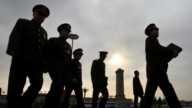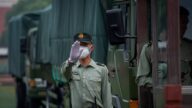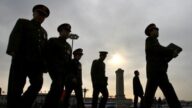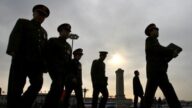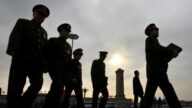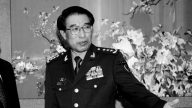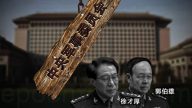【新唐人2014年07月15日讯】中共前中央军委副主席徐才厚6月30号被开除党籍,7月13号,他曾长期任职的“沈阳军区”也传出:已有170多名干部,在联勤部近期推动的“敏感岗位”人员轮换行动中,交出了“铁交椅”。有分析指出,为了公开处理徐才厚,中共中央军委主席习近平必须对“沈阳军区”进行一次“人事大整顿”。
据中共《解放军报》报导,这次轮换的所谓“敏感岗位”,包括涉及分管“人、财、物”的80个师级机关岗位,以及8个团级机关岗位。截至6月底“沈阳军区联勤部”共有170多名任职满3年的干部,告别了“铁交椅”,到新的岗位任职。
报导说,“管人、管钱、管物”等敏感岗位,容易滋生“四风”问题,让“敏感岗位”脱离“敏感”,是“沈阳军区联勤部”党委的共识。
而7大军区中只有“沈阳军区”进行这项轮换,据了解,徐才厚原秘书康晓辉,正是沈阳军区联勤部政委。7月2号,有媒体传出康晓辉被调查。
旅美政论家伍凡指出,尽管中共当局宣称,“敏感岗位人员的轮换”是为了“预防腐败发生”,其实是藉“反腐”的名义,进行权力斗争。
旅美政论家伍凡:“他现在是动军队集中动两个方面,一个沈阳军区、一个兰州军区,都是江泽民时代留下来的,他的左右哼哈大将的两个地区。沈阳军区对习近平来讲,是一个大的要清理的对像,再加上沈阳军区的位置非常重要,它面临朝鲜,如果朝鲜出事情,那沈阳军区能不能负得起保护国家的责任呢?这批人如果不清理掉,对习近平本人的安危,不一定保障。”
北京时政观察人士华颇表示,为了公开处理徐才厚,习近平必须对“沈阳军区”进行一次“人事大整顿”。
北京时政观察人士华颇:“首先对沈阳军区的一些调整,当然是必要的,因为徐才厚在军中经营多年,沈阳军区又是他的发祥地,必须预防徐才厚的死党在军中兴风作浪,所以要把这些人员进行对调,这都是一些必要的手段,这也突显了习近平对军队的担忧,因为江系在军中的根基实在是太大。”
华颇指出,习近平整顿“沈阳军区”还有一个用意,就是为下一步的军队改革铺路。
华颇:“前阵子军队改革被舆论所热炒,包括取消文艺兵、取消济南军区,但是后来国防部发言人一一予以否定,这就说明军队也是一个利益集团,习近平的军事体制改革,也遭到了军队的这些势力的抵抗,所以习近平要通过这次清洗,以反腐败为开道,来实现自己对军队的一些改革设想。”
习近平整顿沈阳军区的同时,7月11号,晋升了4位上将。据报导,这次晋升上将军衔的副总参谋长戚建国、和沈阳军区司令员王教成、政治委员褚益民,以及广州军区政治委员魏亮,都有在“南京军区”任职的背景,而习近平曾任职的福建、浙江、上海等地,也都归“南京军区”管辖。
伍凡:“把不要的人清理掉了,要填补位置嘛,所以他就逐渐启用他的人,这都是配套的。派系斗争,内斗啊,这是正常的一个状态。”
华颇:“这回晋升4名上将,其中沈阳军区的政委和司令员都是破格提升,突显了习近平对沈阳军区的重视。习近平还要进一步清洗,确保军队对他的绝对忠诚,确保枪杆子绝对可靠,我想不单是沈阳军区,恐怕其他的军区也不可能幸免。”
早在去年12月,中共当局就针对“沈阳军区”做了严密部署,大幅调整了副司令员、副政委、参谋长、政治部主任等将领的职务。据了解,徐才厚落马后,“沈阳军区”率先在中共《解放军报》上高调表态,力挺北京当局拿下徐才厚。
采访/朱智善 编辑/陈洁 后制/郭敬
Major Personnel Reshuffle In The Shenyang Military Region
After Xu Caihou former vice chairman of the Central
Military Commission was expelled from the Party on June 30,
the Shenyang Military Region where he served his military
career reportedly vacated more than 170 positions.
This rotation of ‘sensitive posts’ in the Joint Logistics
Department was analyzed to be a ‘cleansing’ of the Shenyang
Military Region for Xi Jinping before he publicly addresses
Xu Caihou’s case.
The Liberation Army Daily reported that the ‘sensitive posts’
are the lead personnel, finance, and material positions.
80 division-level positions and eight group-level positions
have been affected.
By end of June, more than 170 cadres bid farewell
to their ‘tenure positions’ in the Joint Logistics Department
(JLD) of the Shenyang Military Region (SMR).
The report said the sensitive posts are prone to deviation
from the ‘mass line,’ creating problems.
The consensus of the JLD Party Committee
is to remove those posts from its sensitivity.
SMR is the only one among the seven military regions
that conducted this rotation.
Xu Caihou’s former secretary Kang Xiaohui was
the political commissar of the SMR Logistics Department.
In a July 2 media report, it was said that Kang Xiaohui
is under investigation.
Political commentator Wu Fan indicates that it’s claimed
the so-called rotation of sensitive posts prevents corruption.
But it is in fact a power struggle
in the name of anti-corruption.
Wu Fan: “The cleaning of the army will focus on two regions,
the Shenyang Military Region and the Lanzhou Military Region.
Both are from the Jiang Zemin era.
To Xi Jinping, the SMR is a major target due to its proximity
to North Korea.
Will the SMR be able to carry out the task should there be
problems with North Korea?
It is a threat to Xi Jinping if those people remain
in the SMR."
Beijing political analyst Hua Po believes Xi Jinping reshuffled
SMR in preparation to publicly punish Xu Caihou.
Beijing political analyst Hua Po: “It is a must
to first reorganize the SMR.
Xu Caihou had spent years in the military, and SMR was
where he spent most his military career.
His buddies in the military must be controlled
to prevent them from creating troubles.
This also highlights Xi Jinping’s fear of the military.
The Jiang faction’s root in the military is really big."
Hua Po believes the purpose of the SMR reorganization
is also to pave the way for military reform.
Hua Po: “The military reform was stirred,
from the elimination of literary soldiers,
to the canceling the Jinan Military Region.
But the Defense Ministry spokesman denied them all.
That shows the military, as an interest group, has been
resisting Xi Jinping’s military reform.
Xi Jinping’s anti-corruption will clean the SMR
to realize his military reform."
While Xi Jinping reshuffled the SMR, he also promoted
four generals on July 11.
They are Deputy Chief of Staff Qi Jianguo, Wang Jiaocheng,
Chu Yimin of the SMR, and Wei Liang of the Guangzhou
Military Region.
All four served at the Nanjing Military Region.
Xi’s earlier posts at Fujian, Zhejiang and Shanghai were
also under the jurisdiction of the Nanjing Military Region.
Wu Fan: “When the posts were vacated, he will gradually
fill them with his own people. That’s the set up.
It is a routine for the factional fighting or infighting."
Hua Po: “The promotion of the SMR commander
and political commissar to generals is quite exceptional.
It is obvious how important the SMR is to Xi Jinping.
Xi will conduct further reshuffling to ensure absolute loyalty
from the military and the absolute reliability of ‘the gun.’
I think it will also happen to other military regions."
As early as last December, the Communist regime conducted
a substantial arrangement in the SMR positions, including
deputy commander, deputy political commissar, chief of staff,
and director of the Political Department.
When Xu Caihou was sacked, the SMR immediately pledged
their support to Beijing in the Liberation Army Daily.
Interview/Zhu Zhishan Edit/ChenJie Post-Production/GuoJing


